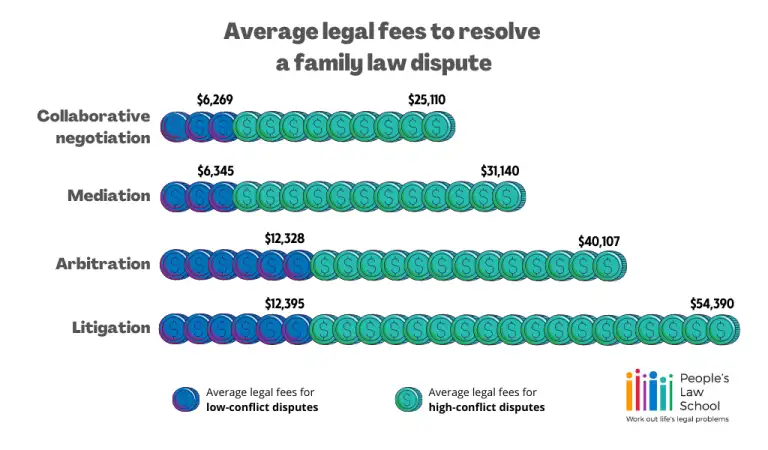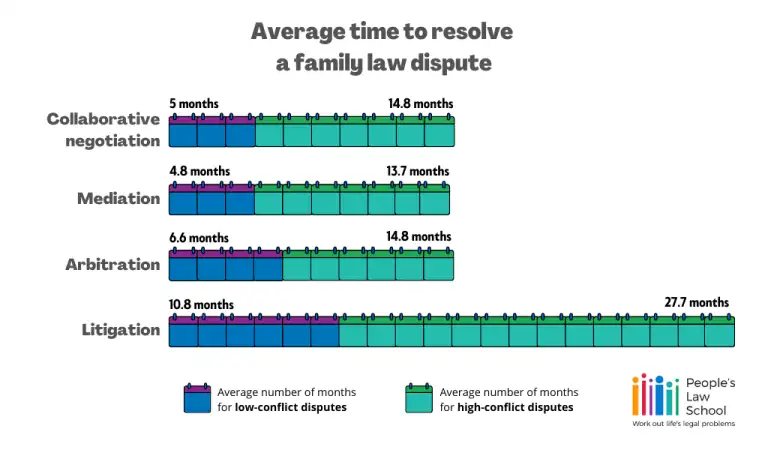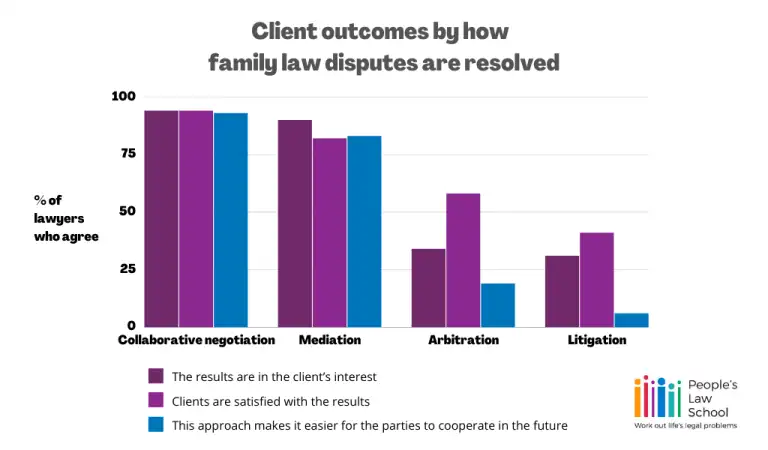Mediation took less than half the time to resolve problems that litigation took. It cost less than half as much. It was generally perceived to produce results that were more likely to be in the interests of the client. Full video transcript.
In a family breakup, if you don’t agree on things, you don’t have to go to court. You can work through your issues — whether about parenting, support, or dividing property — outside the courtroom. Learn how out-of-court approaches are faster, cheaper, and more effective than fighting things out in court.
What you should know
"When my husband and I separated last year, we couldn’t agree on the parenting arrangements for our three kids. I reached out to a lawyer, who suggested we try mediation. We did, and reached an agreement at a fraction of the cost of going to court. And ever since, we’ve been able to work through disagreements about parenting on our own, without a lot of drama."
– Preet, Kelowna, BC

You can deal with family issues in ways that don’t involve going to court:
Negotiation. You and your ex talk through your legal issues and try to agree on how to resolve them.
Mediation. You and your ex meet with a trained, neutral person (called a mediator) who helps you talk to each other and agree on your issues.
Collaborative negotiation. You and your ex hire specially-trained lawyers and agree to do everything you can to agree on your legal issues without going to court.
Arbitration. You and your ex hire a trained, neutral person (called an arbitrator) to make a decision resolving your legal issues. Hiring an arbitrator is like hiring a private judge.
We explain each of these options in a bit more detail below.
All of them can save you a lot of time and money. They can also result in better outcomes than going to court. Let’s take a closer look at how this is possible.
The two charts below compare various approaches to resolving family law disputes. The first shows the average differences in cost. Notably, collaborative negotiation and mediation are half as expensive as going to court (called litigation).

Source: Research by the Canadian Research Institute for the Law and Family (page 30)
This second chart compares the average time investment by approach. Collaborative negotiation, mediation, and arbitration are all far speedier than going to court.

Source: Research by the Canadian Research Institute for the Law and Family (page 39)
If you don’t hire a lawyer
You don’t have to hire a lawyer to deal with your family law issues. You can choose an out-of-court approach — like mediation — and represent yourself for most or all of it.
If you go this route, there’s another cost to consider: the fees charged by the mediator. (Although, there are options for free mediation services; see below under who can help.) The cost of hiring a mediator varies depending on the complexity of your conflict and the mediator’s rates. On average in BC, it costs around $3,000 for a family dispute. That amount is usually split between the parties. Which makes it a relatively good deal in terms of the time, stress, and expense saved by avoiding court.
Lawyers resoundingly say mediation and collaborative negotiation usually result in better outcomes for clients — and for their children — than going to court.

Source: Research by the Canadian Research Institute for the Law and Family (pages 32-34)
That last dimension is incredibly important. Mediation and collaborative negotiation make it much easier for the parties to cooperate in the future. The processes themselves develop communication and problem-solving skills that can help a separating couple work through future disagreements. This is particularly important for couples with children, who benefit from the trickle-down effects of their parents’ skills in these areas for years to come.
Agreements reached through out-of-court approaches also tend to last longer than decisions made by the courts. The parties feel they’ve been heard. They’ve participated in the decision-making process voluntarily and come to an agreement on their own terms. They’re more likely to be satisfied with the decisions they reached than if they had gone to court and had a decision made for them.
By resolving your issues out of court, you and your ex maintain control over the process and the outcome. In mediation or collaborative negotiation, professionals help shape the conversation, but you and your ex make the decisions.
By contrast, litigation is not only an impersonal process, but you have to work within the court’s set framework. Someone who doesn’t know either of you will make decisions that could affect both of you for a very long time.
Approaches like mediation and collaborative negotiation are informal and private. This encourages open and frank discussions between you and your ex. Everything you talk about and any agreement you reach is confidential.
If you use arbitration, the proceedings are likewise private. No one can walk into the hearing room to watch, and the decision isn’t published anywhere.
Court is a different story. The proceedings are open to the public. Any decision made by a judge is a public record, potentially revealing details you’d prefer to keep private.
So there are clear benefits to using mediation, collaborative negotiation, or arbitration instead of fighting it out in court. And, in fact, the law (both provincial and federal) requires people to try to resolve their disagreements out of court if they can.
But there are situations when out-of-court approaches may not work. Sometimes you need the protections that court can uniquely offer. For example, only the courts can make protection orders that restrict contact between the parties. So if there’s a history of family violence, court may be more of a first step rather than a last resort. Other examples can include where:
someone has threatened to harm or hide the children,
one party is hiding financial information, or
one party refuses to participate fairly in the process.
Discussing your situation with a lawyer or mediator can help you figure out whether out-of-court approaches can work for you. See below, under who can help.
Options to resolve family law issues out of court
Say you want your children to live mostly with you. But your ex wants the children, too. One option is for the two of you to sit down and talk. You might be able to come up with a solution working with each other. This is negotiation.
You can negotiate directly with your ex. Or you can hire a lawyer to help you.
If you try negotiation on your own
If you try to work out your family law issues without a lawyer, make sure you and your ex first agree that your negotiations are without prejudice. This means neither of you can use anything that’s been said, including ideas about solutions, if you end up in court.
Collaborative negotiation is a type of confidential negotiation process where you and your ex each have your own specially-trained lawyer. All four of you agree to do everything possible to reach a fair settlement without going to court. You also agree that if either party starts a court case, both lawyers must stop their representation.
A key feature of this approach, which is also known as collaborative practice or collaborative family law, is the involvement of other specialists. To help you work out thorny issues, you can bring in counsellors, child psychologists, financial experts, or others. They can attend the negotiations to provide input and help you reach a settlement.
During the negotiations, you and your ex are expected to provide full and timely financial disclosure. You also have to negotiate in good faith. When you and your ex reach an agreement on your legal issues, your lawyers will put the agreement in writing.
In mediation, you and your ex agree to meet with a neutral person called a mediator. They have special training in helping you talk with each other. Many mediators are lawyers, though as a mediator they aren’t representing either of you; their job is to work with you both to find a solution you agree on. They don’t decide for you or force you to make an agreement or accept a solution.
Mediation meetings are typically two to six hours long, and take place at the mediator’s office. By the end of the session, the goal is to have reached an agreement on some or all of your family law issues.
In using mediation to resolve family issues, we dig into how mediation works, how to prepare for it, and tips to be successful on the day of your mediation.
Arbitration has the opportunity to be a lot more flexible, a lot quicker, speedier and more efficient than litigation processes allow. Full video transcript.
In arbitration, you and your ex hire a trained, neutral person called an arbitrator. Their job is to listen to your evidence and your arguments, and then make a decision resolving your legal issues, as a judge would. Many arbitrators are lawyers, though as an arbitrator they aren’t representing either of you and can’t give you legal advice.
Arbitration offers far more flexibility than going to court. You and the other party agree in advance on the rules of the arbitration process. You get to choose the arbitrator. And an arbitration decision is just as binding and enforceable as a court order.
Also, the arbitration process is private. Your arbitration hearing is closed to the public, and the decision isn’t published anywhere.
Who can help

JP Boyd on Family Law (on resolving issues out of court)
In-depth explanations of options to resolve family law disputes out of court.

Out-of-court approaches
Avoid court with mediation, collaborative negotiation, or arbitration.

ADR Institute of BC
Maintains a roster of qualified mediators and arbitrators who help with dispute resolution.

Family Justice Centres
Listing of family justice centres across BC offering free mediation services.


